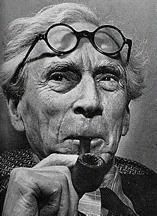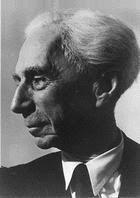
Bertrand Russell
(Bertrand Arthur William Russell, 3. Earl Russell)
18.05.1872 - 02.02.1970

 |
Bertrand Russell(Bertrand Arthur William Russell, 3. Earl Russell)18.05.1872 - 02.02.1970 |
 |
| Biography
(deutsch, english) Full texts Principal publications Additional links |
![]() Bertrand
Arthur William Russell, 3. Earl Russell (geboren am 18. Mai 1872 bei Ravenscroft
(Monmouthshire), Wales; gestorben am 2. Februar 1970 in Penrhyndeudraeth, Wales)
war Mathematiker (im speziellen Logiker) und Philosoph. Er unterrichtete zeitweise
am Trinity College in Cambridge. In seiner Arbeit stützte er sich unter anderem
auf Leibniz, Peano und Frege. Wittgenstein war teils sein Schüler, teils sein
Gesprächspartner. Er wurde von ihm angeregt, seine Arbeit weiter zu treiben.
Russell wird zusammen mit George Edward Moore als Begründer der sprachanalytischen
Richtung der Sprachphilosophie betrachtet. Sein erstes Buch schrieb Bertrand
Russell über die deutsche Sozialdemokratie (1896). Neben seinen mathematischen
Schriften veröffentlichte er noch viele weitere gesellschaftskritische und philosophische
Studien. Im Jahr 1950 erhielt Russell den Nobelpreis für Literatur. In der Mengenlehre
wurde Russell durch das nach ihm benannte Paradoxon (Russellsche Antinomie)
berühmt. Es tritt auf, wenn man die Menge aller Mengen betrachtet, die nicht
Element ihrer selbst sind. Solch eine Menge scheint nur dann ein Element seiner
selbst zu sein, wenn es nicht Element seiner selbst ist. Eine populäre Version
des Paradoxons, ist die Geschichte des Barbiers in einem Ort, der von sich selbst
behauptet, er rasiert alle Männer in dem Ort, die sich nicht selbst rasieren.
Was macht er dann aber mit sich selbst? Rasiert er sich selbst oder rasiert
er sich nicht selbst? Hier tritt ein Widerspruch auf. Russell war als ausgesprochener
Pazifist und Friedensaktivist bekannt. 1918 verbüßte er aufgrund seines öffentlichen
Eintretens für den Pazifismus eine sechsmonatige Haftstrafte, wegen der er schließlich
seine Anstellung am Trinity College verlor. 1955 verfasste er zusammen mit Albert
Einstein (u.a.) ein Russell-Einstein-Manifest, in dem zur Verantwortung in Wissenschaft
und Forschung aufgerufen wurde (siehe auch Pugwash-Konferenzen). 1963 rief er
gemeinsam mit Jean-Paul Sartre das Vietnam-Tribunal gegen die USA ins Leben.
Es folgten drei weitere Russell-Tribunale.
Bertrand
Arthur William Russell, 3. Earl Russell (geboren am 18. Mai 1872 bei Ravenscroft
(Monmouthshire), Wales; gestorben am 2. Februar 1970 in Penrhyndeudraeth, Wales)
war Mathematiker (im speziellen Logiker) und Philosoph. Er unterrichtete zeitweise
am Trinity College in Cambridge. In seiner Arbeit stützte er sich unter anderem
auf Leibniz, Peano und Frege. Wittgenstein war teils sein Schüler, teils sein
Gesprächspartner. Er wurde von ihm angeregt, seine Arbeit weiter zu treiben.
Russell wird zusammen mit George Edward Moore als Begründer der sprachanalytischen
Richtung der Sprachphilosophie betrachtet. Sein erstes Buch schrieb Bertrand
Russell über die deutsche Sozialdemokratie (1896). Neben seinen mathematischen
Schriften veröffentlichte er noch viele weitere gesellschaftskritische und philosophische
Studien. Im Jahr 1950 erhielt Russell den Nobelpreis für Literatur. In der Mengenlehre
wurde Russell durch das nach ihm benannte Paradoxon (Russellsche Antinomie)
berühmt. Es tritt auf, wenn man die Menge aller Mengen betrachtet, die nicht
Element ihrer selbst sind. Solch eine Menge scheint nur dann ein Element seiner
selbst zu sein, wenn es nicht Element seiner selbst ist. Eine populäre Version
des Paradoxons, ist die Geschichte des Barbiers in einem Ort, der von sich selbst
behauptet, er rasiert alle Männer in dem Ort, die sich nicht selbst rasieren.
Was macht er dann aber mit sich selbst? Rasiert er sich selbst oder rasiert
er sich nicht selbst? Hier tritt ein Widerspruch auf. Russell war als ausgesprochener
Pazifist und Friedensaktivist bekannt. 1918 verbüßte er aufgrund seines öffentlichen
Eintretens für den Pazifismus eine sechsmonatige Haftstrafte, wegen der er schließlich
seine Anstellung am Trinity College verlor. 1955 verfasste er zusammen mit Albert
Einstein (u.a.) ein Russell-Einstein-Manifest, in dem zur Verantwortung in Wissenschaft
und Forschung aufgerufen wurde (siehe auch Pugwash-Konferenzen). 1963 rief er
gemeinsam mit Jean-Paul Sartre das Vietnam-Tribunal gegen die USA ins Leben.
Es folgten drei weitere Russell-Tribunale.
![]() Bertrand
Arthur William Russell, 3rd Earl Russell (May 18, 1872 – February 2, 1970) was
one of the most influential mathematicians, philosophers, and logicians of the
modern age, working mostly in the 20th century. A prolific writer, Russell was
also a populariser of philosophy and a commentator on a large variety of topics,
ranging from very serious issues to the mostly mundane. Russell's elegant prose,
clarity of expression, and biting wit were widely admired. Continuing a family
tradition in political affairs, he was an influential libertarian activist for
most of his long life. Millions looked up to Russell as a prophet of the creative
and rational life; at the same time, his stances on many topics were extremely
controversial. Born at the height of Britain's economic and political ascendancy,
he died of influenza nearly a century later when Britain's empire had all but
vanished, and her power had dissipated in two victorious, but debilitating world
wars. As one of the world's most well-known intellectuals, Russell's voice carried
enormous moral authority, even into his late nineties. Among his other political
activities, Russell was an influential proponent of nuclear disarmament and
an outspoken critic of the American war in Vietnam. In 1950, Russell was made
Nobel Laureate in Literature "in recognition of his varied and significant writings
in which he champions humanitarian ideals and freedom of thought".
Bertrand
Arthur William Russell, 3rd Earl Russell (May 18, 1872 – February 2, 1970) was
one of the most influential mathematicians, philosophers, and logicians of the
modern age, working mostly in the 20th century. A prolific writer, Russell was
also a populariser of philosophy and a commentator on a large variety of topics,
ranging from very serious issues to the mostly mundane. Russell's elegant prose,
clarity of expression, and biting wit were widely admired. Continuing a family
tradition in political affairs, he was an influential libertarian activist for
most of his long life. Millions looked up to Russell as a prophet of the creative
and rational life; at the same time, his stances on many topics were extremely
controversial. Born at the height of Britain's economic and political ascendancy,
he died of influenza nearly a century later when Britain's empire had all but
vanished, and her power had dissipated in two victorious, but debilitating world
wars. As one of the world's most well-known intellectuals, Russell's voice carried
enormous moral authority, even into his late nineties. Among his other political
activities, Russell was an influential proponent of nuclear disarmament and
an outspoken critic of the American war in Vietnam. In 1950, Russell was made
Nobel Laureate in Literature "in recognition of his varied and significant writings
in which he champions humanitarian ideals and freedom of thought".
On
Denoting (1905)
Vagueness (1923)
Icarus
or The Future of Science (1924)
What is an Agnostic
Knowledge and
Wisdom
Why I am
not a Christian (06.03.1927)
In Praise
of Idleness (1932)
Of Co-Operation
(18.05.1932)
On Sales Resistance
(22.06.1932)
On Modern
Uncertainty (20.07.1932)
What is the Soul?
(28.09.1932)
On youthful
Cynism (1930)
Philosophical
Consequences of Relativity (1626)
On Astrologers
How
to become a Man of Genius (28.12.1932)
Education
and Disciple
What
Desires are politically important? (Speech at the Nobel Award, 11.12.1950)
Prolog to his Autobiography: What
I have lived for
|
Anita
Selig - back to my Homepage
|